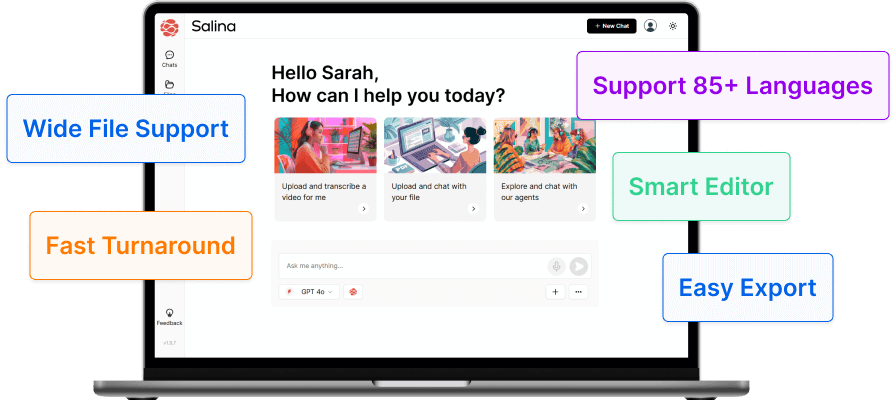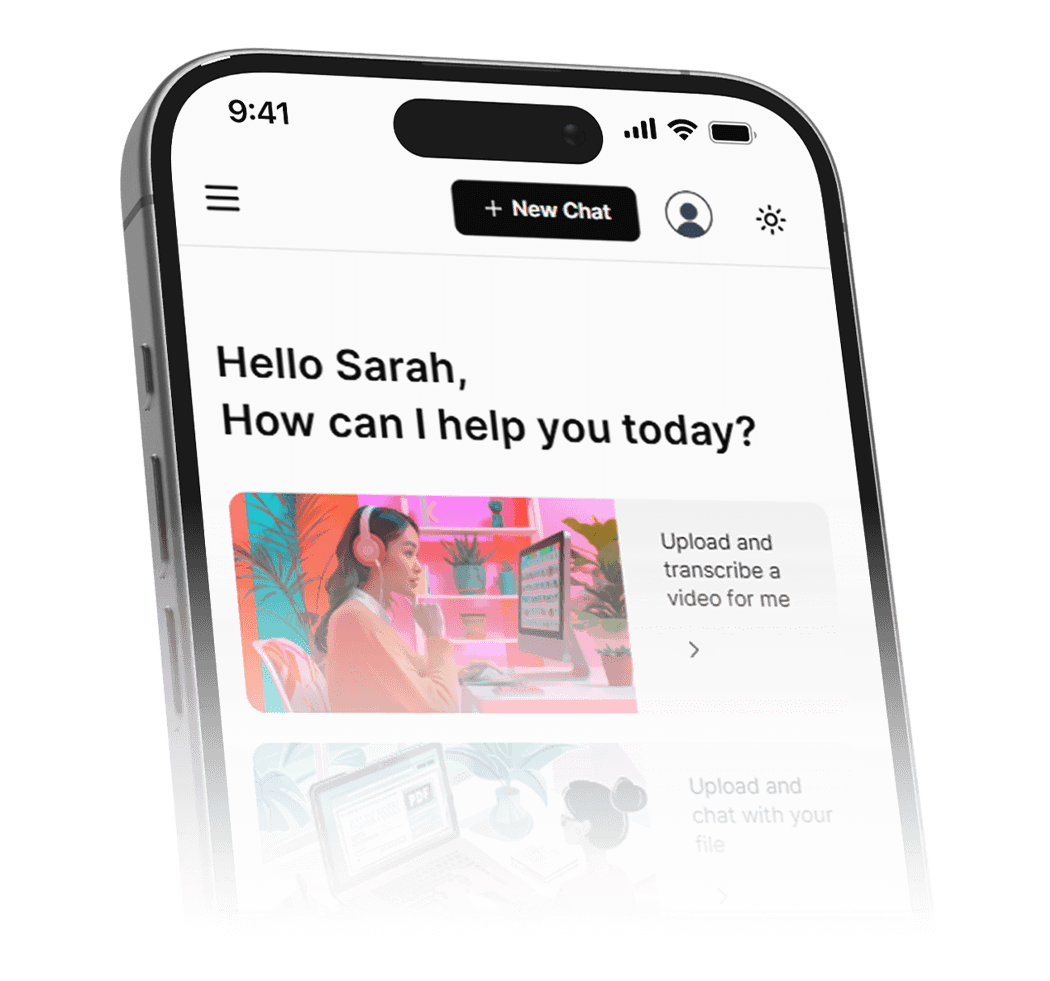Your show notes can do more than summarize – they can attract new listeners, boost SEO, and grow your audience. These five proven templates will enhance your podcast documentation, captivating listeners and increasing your show’s impact.
Create professional show notes that serve your listeners and grow your podcast. These templates cover every episode type, helping you build valuable documentation that extends beyond the audio. Whether you’re documenting a quick interview or creating comprehensive educational content, having the right template saves time and enhances your listeners’ experience.
Why Well-Crafted Show Notes Drive Podcast Success
Show notes aren’t just episode summaries – they’re powerful tools for growth, engagement, and accessibility. Good show notes help new listeners discover your content, give regular listeners a reliable reference, and create additional value from your audio content. They also make your content more shareable and help search engines understand what your episodes cover. Strategic show notes serve multiple purposes: they help listeners decide if an episode is right for them, provide easy navigation through timestamps, offer valuable resources, and create a searchable archive of your content. When done right, they become a valuable part of your podcast’s overall strategy.
Choose the Right Template for Your Podcast Style
Each podcast type needs a different approach to show notes. Interview shows need clear speaker identification and quote highlights. Educational podcasts require structured learning resources. Story-based shows benefit from character lists and plot summaries. The following templates are designed to match different podcast styles while maintaining professional standards and efficient workflows. By selecting the appropriate template for your podcast style, you can ensure that your show notes effectively complement your content and enhance the overall listener experience.
1. The Minimalist Template: Ideal for creating polished show notes in record time
Creating great show notes shouldn’t be complicated. A straightforward approach helps you document your episodes without spending hours on writing. Most podcasters get stuck trying to include everything in their show notes, which often leads to information overload and wasted time. The key is focusing on what your listeners actually need.
Quality show notes come from being selective about what you include. When you remove the unnecessary details and focus on essential information, you make it easier for your audience to find what they’re looking for. Your listeners can quickly scan the content, and you’ll spend less time on documentation and more time creating great episodes.
Example:
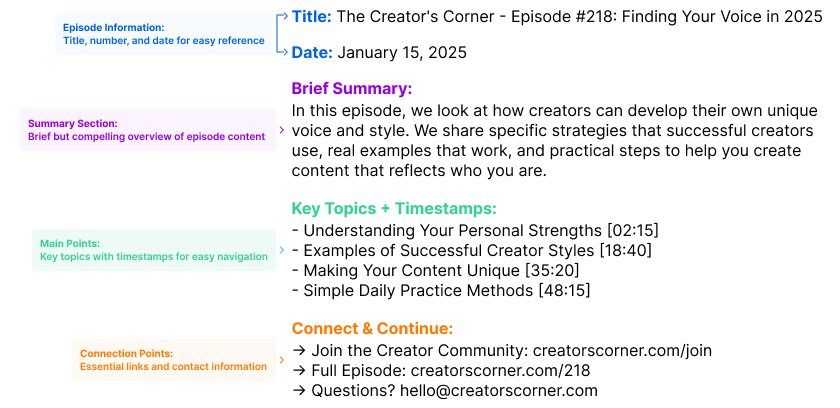
How to Write It:
- Create a clear episode title that includes your show name and episode number
- Add today’s date for archival purposes
- Write a 2-3 sentence summary focusing on the main value for listeners
- List 3-5 key discussion points with exact timestamps
- Include only essential links (subscription, episode, contact)
- Use consistent formatting for each section
- Keep the entire document to one page or less
- Double-check all timestamps for accuracy
Perfect for weekly shows where you need to maintain quality show notes without spending hours on documentation. Choose this format when you’re a solo podcaster managing multiple tasks, when your episodes don’t require extensive resource lists, or when you need to publish show notes quickly while maintaining professional standards.
2. The Monetizer: Built for podcasters ready to monetize their content
Podcast show notes can do more than summarize your episode – they can help support your business growth. Finding the right balance between valuable content and promotional materials often challenges podcasters. Many creators struggle to include sponsorships and affiliate links without making their show notes feel like one long advertisement.
A well-organized approach to monetization makes your promotional content feel natural and helpful. When you structure your notes thoughtfully, sponsor mentions and product recommendations become valuable resources rather than interruptions. Listeners appreciate when you organize promotional content in a way that helps them find useful tools and services.
Example:
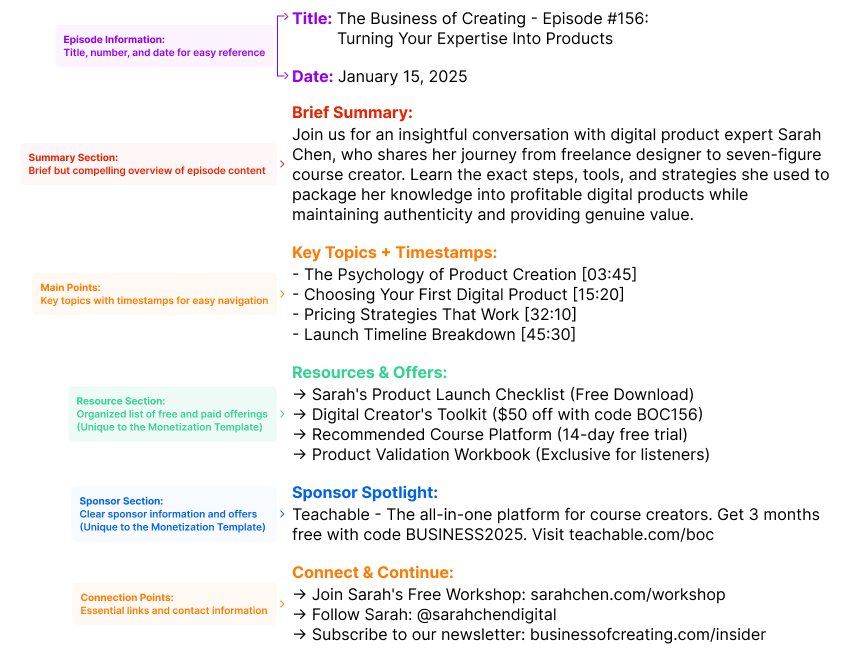
How to Write It:
- Start with episode information (title, number, date)
- Write your summary section (2-3 compelling sentences)
- List main points with timestamps (3-5 key topics)
- Organize resources from free to paid offerings
- Write clear sponsor descriptions with offer codes
- Include connection points (subscription, social, contact)
- Double-check all links and offer codes
- Verify all timestamps are accurate
This format works best for podcasts that include sponsorships, affiliate partnerships, or promote digital products. It’s ideal for business-focused shows, educational content, and episodes that reference specific tools or resources. Choose this template when you have valuable offers to share while maintaining the primary focus on delivering quality content to your listeners.
3. The Long-form: Designed for episodes rich with detailed information
Many podcasters miss the opportunity to turn their audio content into valuable written resources. While basic show notes serve a purpose, some episodes contain information that deserves a more detailed treatment. Converting your podcast content into comprehensive written form helps both your current listeners and attracts new audience members through search engines.
Detailed show notes create a reference guide that listeners can return to again and again. When your episode covers complex topics, step-by-step processes, or in-depth interviews, expanding your notes into article format provides extra value. Your content becomes more accessible, shareable, and useful for people who prefer reading to listening.
Example:
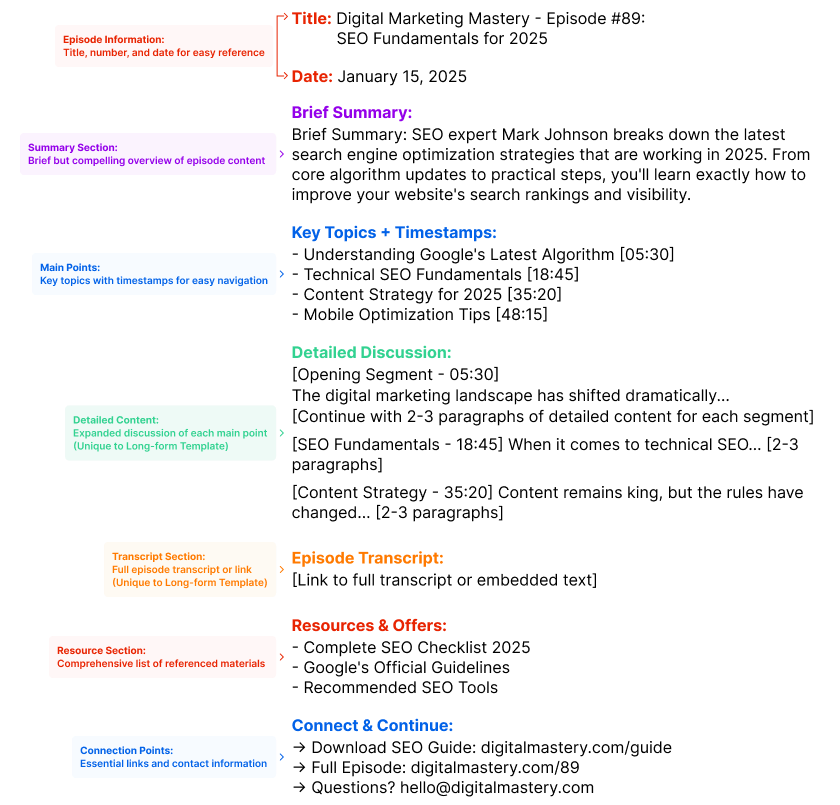
How to Write It:
- Start with episode information (title, number, date)
- Write your summary section (2-3 compelling sentences)
- List main points with timestamps (3-5 key topics)
- Expand each main point into detailed paragraphs
- Include relevant quotes from the episode
- Add transcript or transcript link
- Organize resources by topic
- Include connection points (subscription, social, contact)
- Review for SEO optimization
- Verify all timestamps and links
Perfect for episodes packed with technical information, step-by-step processes, or detailed interviews that benefit from written explanation. Choose this format when you want your show notes to serve as a standalone resource, when SEO visibility is important, or when your audience frequently refers back to episode content.
4. The Educator: Created for educational episodes that need structure
Educational podcasts require a different approach to show notes – one that supports actual learning and retention. Students and learners need more than just timestamps and summaries; they need structured content that helps them grasp and review concepts. Creating educational show notes means thinking like a teacher, not just a content creator.
Structured learning materials make your educational content more valuable and actionable. When you provide clear objectives, supporting resources, and practice materials, you transform your podcast from simple audio content into a true learning experience. This organized approach helps listeners track their progress and apply what they’ve learned.
Example:
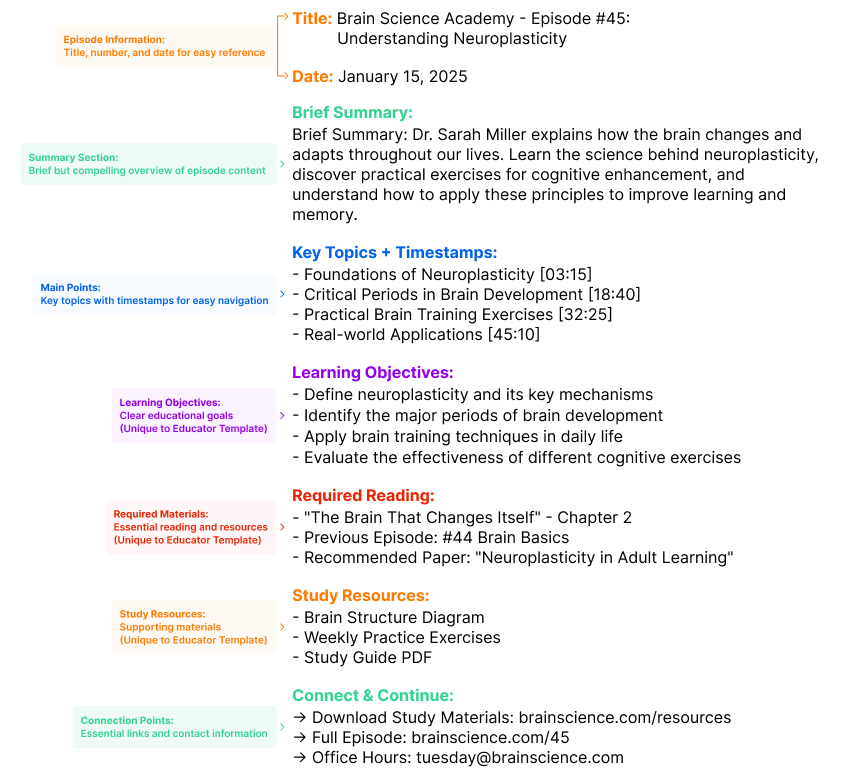
How to Write It:
- Start with episode information (title, number, date)
- Write your summary section (2-3 compelling sentences)
- List main points with timestamps (3-5 key topics)
- Define clear learning objectives
- List required materials and prerequisites
- Include supplementary study resources
- Add connection points
- Verify all timestamps and links
Ideal for educational podcasts, training series, or any content focused on teaching specific skills or concepts. Use this template when your episodes are part of a structured learning experience, when listeners need supporting materials to fully grasp the content, or when you want to create a comprehensive learning resource.
5. The Storyteller: Made for episodes with complex narratives and plotlines
Stories need space to breathe and develop, and your show notes should reflect this. Great storytelling podcasts build worlds, introduce memorable characters, and take listeners on journeys – elements that deserve special attention in your documentation. Story-focused show notes help listeners track complex narratives and remember key details.
Narrative podcasts often include multiple characters, timeline shifts, and important plot points that listeners might want to revisit. By organizing your show notes to highlight these elements, you enhance the listening experience and make your stories more accessible. Whether you’re sharing historical events, personal experiences, or fictional tales, proper documentation helps your audience stay engaged with your narrative.
Example:
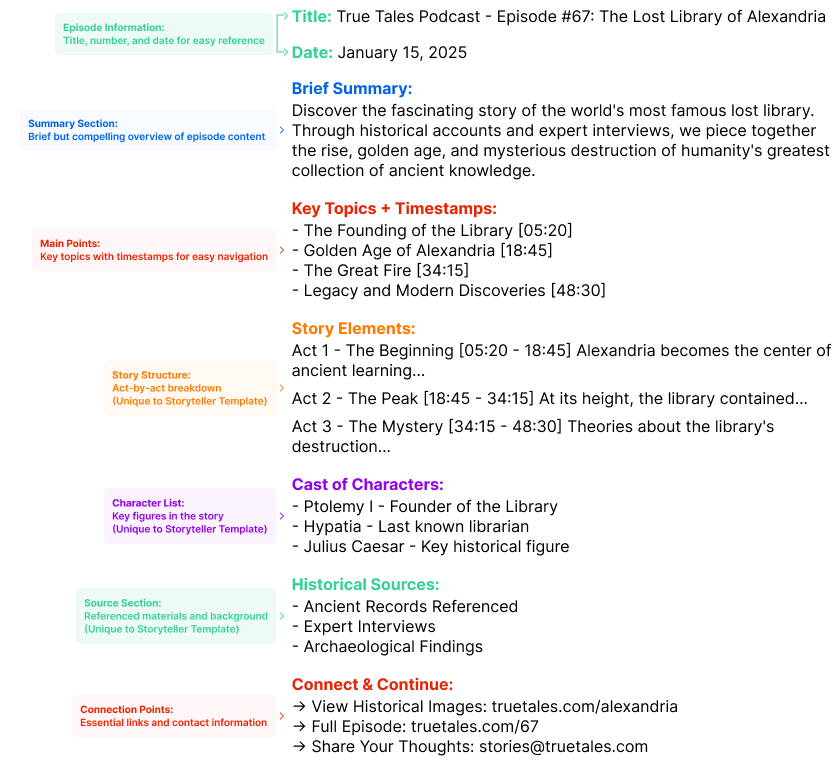
How to Write It:
- Start with episode information (title, number, date)
- Write your summary section (2-3 compelling sentences)
- List main points with timestamps (3-5 key topics)
- Break down story into acts with timestamps
- List key characters or figures
- Include relevant source materials
- Add connection points
- Verify all timestamps and links
This format works best for narrative podcasts, historical retellings, or any episode structured around a central story. Use it when you’re sharing personal experiences, historical events, or detailed case studies where maintaining narrative flow is crucial to understanding the content.
Start Creating Better Show Notes Today
These five templates are more than just formats—they’re your toolkit for creating professional, effective show notes that serve both you and your listeners. Start with the template that best matches your podcast style and needs, then experiment to find what works best for your show. Remember, great show notes balance information with accessibility, helping your listeners get more value from your content while making your workflow more efficient.



